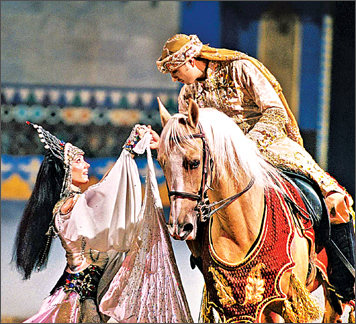Imagined magic carpets
[Orientalism in a nutshell]
* Primary term used for aspects of Eastern cultures as portrayed
in the West
* Widely used to refer to works of French artists in the 19th
century.
* Edward Said redefined the term in his celebrated work,
‘Orientalism’
* In essence it refers to the East in contrast to the West
 ‘Oh
East is East and West is West, and never the twain shall meet’ - Rudyard
Kipling ‘Oh
East is East and West is West, and never the twain shall meet’ - Rudyard
Kipling
In his much quoted verse above, Rudyard Kipling revealed something of
the nucleus of the long-lived tradition of Orientalist thought. The
ambivalence of the West towards the East is age-old. Although the
concept of globalization has brought the East and West together, still
we have our own particularities.
The ‘rich cultures’, ‘superior civilizations’ and ‘ancient wisdom’ of
the Orient have inspired many Westerners. But equally, there were doubts
about its mysteries, religion and past. For many, the Orient has been a
dominion of hordes and despots or spiritual mystics and exotic
sensuality. And Orient brings caliphs and harems, genii and giaours,
magic carpets and Circassian beauties to one’s mind.
|

A scene from Arabian Nights |
Orientalism is the way the West think about the East. As far as
literature is concerned it refers to the discourse by the West about the
East, which comprises a vast corpus of texts – literary, sociological
political or anthropological – which has been accumulating since the
Renaissance and particularly since the 18th century and to which there
is no counterpart in the East about West.
The motif of Orientalism played an important role in eighteenth- and
nineteenth-century literary works in Europe. Fuelling the creative
imaginations of artists, literary figures, and in fact all of Europe,
this fascination with the Orient also influenced many of the Romantic
writers, who situated novels and poetry alike in the mysterious far-off
lands of Turkey, India, the Middle-East, and Asia.
Although the earliest travelogues written by Westerners depicted
inhabitants of the Orient as “Noble Savages,” they also provided sources
of inspiration for Western writers.
In addition to travelogues, this time period was marked by a
flowering of scholarship on Eastern literature, history, philosophy, and
religion. George Sale completed his translation of the Koran, and such
scholars as William Jones (who translated from Arabic, Persian, Hebrew,
and Sanskrit) acquainted Western readers for the first time with such
texts as the Mahabharata and the Arabian Nights. The Arabian Nights in
particular became a favourite in Europe, giving rise to an enormous
number of imitators who wrote their own Oriental tales and romances.
Romantic writers Lord Byron, Thomas Moore, Robert Southey, and many
others nevertheless continued to write in the Orientalist mode, mining
the texts of Sir William Jones and other Oriental scholars for details
about primitive Oriental landscape, dress, and military strategy, which
they incorporated into their works. The Romantic emphasis on liberty
also politicized their poetry, so that many of the Orientalist works for
example, Robert Southey’s Thalaba (1801), Thomas Moore’sLalla Rookh
(1817), and Lord Byron’s “Turkish Tales” depict the struggle to
overthrow a powerful Oriental tyrant.
Encountering the East has been significant for the self-image of the
West producing identities ranging from decadent European modernity to
concepts of cultural, racial and moral superiority.
In his highly celebrated but also provoking book Orientalism, Edward
Said (1935–2003) embarks on describing a long European tradition ”of
coming to terms with the Orient that is based on the Orient’s special
place in European Western experience.” This tradition Said calls
Orientalism. Said’s analysis of Orientalist discourse draws on various
academic and non-academic sources, and the Orient of Said’s focus is
limited mainly to Arab Muslim areas in the Middle East.
The Orient has not been significant to Europe only for its sheer
proximity, but for the fact that European states have had their richest
and oldest colonies in the territory which has also been seen as the
source of European civilizations and languages. The West seems like
being enchanted by a spell of the East.
But there is neither East nor West, Border, nor Breed, nor Birth,
When two strong men stand face to face, tho’ they come from the ends of
the earth!
- Rudyard Kipling.
|



